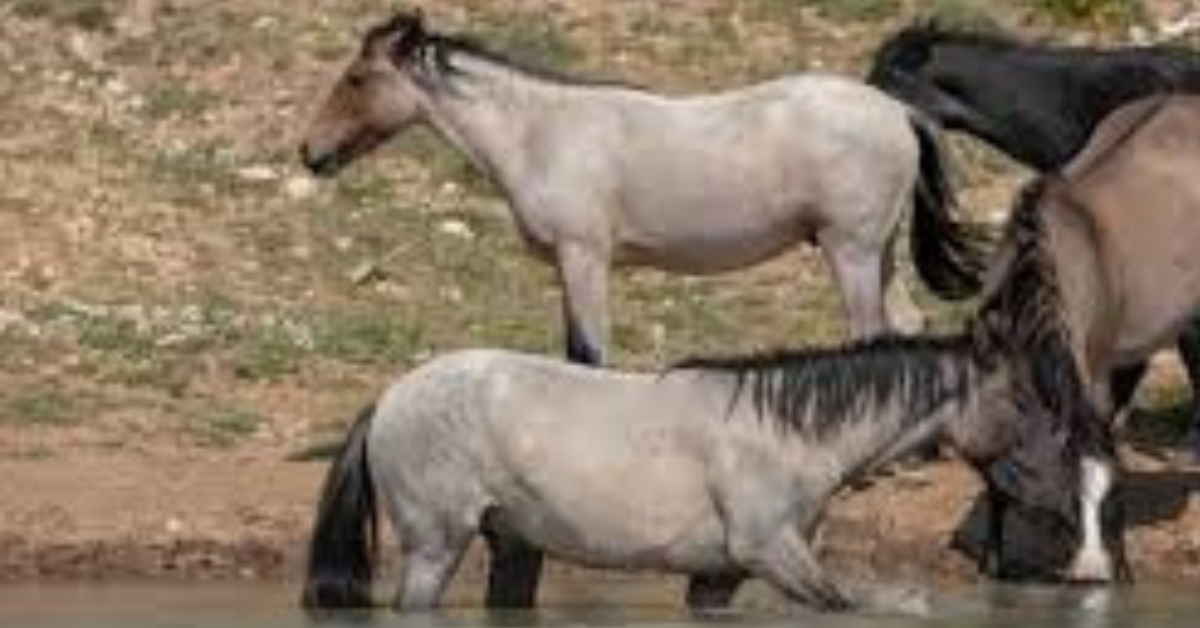Introduction
Grulla horses, often admired for their striking appearance and unique coloration, are a captivating subject for horse enthusiasts and breeders alike. A Grulla horse is a horse with a distinctive coat color characterized by a slate-gray or smoky appearance, often accompanied by primitive markings such as a dorsal stripe along the spine, zebra-like stripes on the legs, and sometimes shoulder stripes. This guide delves into every aspect of the Grulla horse, providing a comprehensive overview that covers their history, characteristics.
History and Origin of Grulla Horses
Grulla horses have a rich history that dates back to ancient times. The term “Grulla” (or “Grullo” for males) comes from the Spanish word for “crane,” reflecting the grayish-blue hue of their coat. These horses were first noted among wild mustangs in the American West, particularly in areas where Spanish horses had been released or had escaped. The Grulla coloration is not breed-specific but rather a rare genetic trait that can occur in various breeds.
Physical Characteristics
Grulla horses are instantly recognizable by their distinctive appearance. Here are some key physical characteristics:
- Color: The most defining feature is the slate-gray or smoky color, often with darker points on the mane, tail, and lower legs.
- Dorsal Stripe: A prominent dark stripe runs along the spine from the withers to the tail.
- Leg Barring: Some Grullas have zebra-like stripes on their legs.
- Body Build: They typically have a sturdy, muscular build, which varies depending on the breed.
The Unique Coloration of Grulla Horses
The Grulla coloration is a result of a specific genetic combination. It is a dilution gene affecting a black base coat, resulting in the characteristic grayish-blue color. This gene is also responsible for the dorsal stripe and other primitive markings such as leg barring and shoulder stripes. The Grulla coat can vary slightly in shade, from light silvery-gray to deep, almost black tones.
Training and Temperament
Grulla horses, like any other, have varied temperaments depending on their breed and individual personality. Generally, they are known for their intelligence, making them quick learners and relatively easy to train. Their adaptability enables them to perform well in a wide range of equestrian activities, from leisure trail riding to competitive sports. Many Grulla horses exhibit a calm and friendly temperament, though this can vary significantly among individuals.
Training Grulla horses should ideally start at a young age, emphasizing the importance of building trust and consistent handling. Positive reinforcement techniques are particularly effective with these intelligent and responsive animals, helping to create a strong bond between horse and handler. Early and consistent training ensures that Grulla horses develop into well-rounded and reliable companions, capable of performing well in a variety of roles.
Breeding Grulla horses
Breeding Grulla horses involves a deep understanding of their unique genetics to achieve the desired coloration. The Grulla coat is the result of a specific dilution gene acting on a black base coat, producing the characteristic slate-gray color with primitive markings such as a dorsal stripe and leg barring. To increase the likelihood of producing a Grulla foal, breeders often use genetic testing to confirm the presence of this dilution gene in potential parent horses. Selective breeding practices, where horses with known Grulla lineage or similar color traits are paired, can enhance the chances of achieving the desired outcome.
Successful breeding also requires maintaining detailed records of pedigrees to track the inheritance of coat color traits. This practice not only aids in predicting the potential coloration of offspring but also helps in preserving the health and quality of the breed. While achieving the Grulla coloration can be complex and sometimes challenging, the result is a unique and stunning horse that is highly valued in various equine circles. Responsible breeding practices are crucial to ensure the well-being of the horses and the continuation of these distinctive traits.
Facts
- Dorsal Stripe: One of the defining characteristics of Grulla horses is a prominent dorsal stripe that runs down the spine from the mane to the tail.
- Primitive Markings: In addition to the dorsal stripe, Grulla horses often have other primitive markings, such as leg barring (zebra stripes) and shoulder stripes.
- Rarity: Grulla is a relatively rare color, making up a small percentage of the horse population. This rarity can make Grulla horses particularly sought after by breeders and enthusiasts.
- Gene Inheritance: The Grulla color results from a black horse inheriting the dun gene. The dun gene dilutes the black coat to create the Grulla shade, while also adding the primitive markings.
- Breed Versatility: Grulla coloration can be found in many different horse breeds, including the American Quarter Horse, Mustang, and even some pony breeds.
- Historical Significance: The Grulla color is believed to be one of the oldest horse coat colors, often associated with ancient and primitive horses depicted in prehistoric cave paintings.
- Hardiness: Grulla horses, particularly those in wild or semi-wild herds like Mustangs, are known for their hardiness and ability to thrive in challenging environments.
- Popularity in Competitions: Due to their striking appearance, Grulla horses are often popular in show rings, particularly in halter classes, where their unique color can be a standout feature.
FAQs
What is the difference between Grulla and Grullo?
Grulla typically refers to the color of a female horse, while Grullo refers to a male horse.
Can any breed of horse be a Grulla?
Yes, the Grulla coloration can appear in various breeds, although it is more common in certain breeds like the American Quarter Horse and Mustang.
How rare are Grulla horses?
Grulla horses are relatively rare due to the specific genetic combination required to produce their unique coloration.
What are some common health issues in Grulla horses?
They generally face the same health issues as other horses, such as hoof problems, colic, and dental issues. There are no health problems specifically associated with the Grulla coloration.
